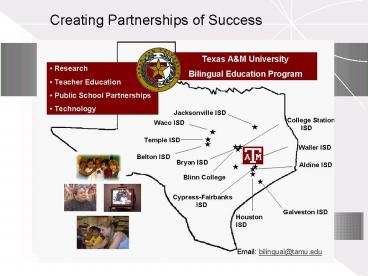Bilingual Education Program at Texas A - PowerPoint PPT Presentation
1 / 29
Title:
Bilingual Education Program at Texas A
Description:
Bilingual Education Program at Texas A – PowerPoint PPT presentation
Number of Views:456
Avg rating:3.0/5.0
Title: Bilingual Education Program at Texas A
1
Creating Partnerships of Success
Email bilingual_at_tamu.edu
2
Parental Involvement
More than PTA...
3
Parental Involvement
- Texas AMs Bilingual Program is a partner with
three strong parental involvement projects that
serve over 250 parents weekly.
4
Timeline with Parental Involvement
- Aldine ISD
- 1995 to date
- Bryan ISD
- 2000-to-date
- Cypress-Fairbanks ISD
- 1996 to 2000
- Waller ISD
- 2001- to date
5
Funding
- Part of OELA School-Wide Improvement Grants to
Districts - State and District Funds
- Qualified Volunteers
6
Benefits of Parental Involvement
- Affective Motivation for children
- (Crawford, 1989, Connell Wellborn, 1990)
- Promotes Academic Achievement
- (Epstein, 1990, 1992, Hidalgo, et al., 1995
Suárez-Orozco Suárez-Orozco, 2001)
Parent involvement reinforces L1 development
- Empowers Parents by Promoting Their Own
Linguistic, Academic, and Technology Skills
7
Barriers to Overcome
- Barriers may be in place that serve to limit some
Hispanic parents involvement (Bermúdez,
Márquez, 1996 Cummins, 2001 Inger, 1992
Suárez-Orozco Suárez-Orozco, 2001).
8
Threats
- inconvenient times such as during working hours
- material is sent home in English only
- school personnel that rarely speaks Spanish
- few administrators or teachers are offered
guidance or training to help them understand and
reach Hispanic families - often both parents work, and may work a long
distance from the school - intense financial pressures and work
- long hours
9
Threats, cont.
- Improperly lit campuses in inner city or rural
communities may deter participation, particularly
at night - child care arrangements
- some parents may have had bad experiences with
schools themselves - reluctant to question school personnel
- lack of understanding of the school system
- perceive the schools role as
- that of instilling knowledge
- often parents do not feel needed or wanted in
their children's schools
10
We Can Overcome
- Vargas and Fultz (2001) found that parents were
highly motivated to - obtain better jobs,
- to help their children with their homework and
school success - the third prevailing theme was
- parental self improvement.
11
- Parents needs may need to be met before they can
fully contribute to their childs education - This is not to imply that these can not all
coexist and develop concurrently.
12
A Successful Parent Involvement Model
Parenting Classes GED ESL Technology
13
CLD families need a new parental involvement
paradigm which broadens the repertoire of the
family capital
- (a) increasing parental awareness of school
procedures and community resources - (b) providing self-improvement training where
parents can acquire skills that may help them
secure jobs outside of low-paying jobs - (c) Increasing awareness of their rights and
responsibilities.
14
NEEDS
15
- Opportunity for social gatherings and
celebrations - Programs and meetings that directly made parent
concerns - Classes on helping their children in a fun and
non academic way, yet in a manner that complies
with the state mandated objectives and school
goals. - Evaluation instruments for the program
- Constant program evaluation and restructure as
deemed necessary and according to parental needs.
16
Hispanics Need Technology Access and Training
- Vast inequities in access to technology for
Hispanic parents and children
17
Technology Literacy is a NecessityBeyond
Functional Literacy
18
with Home Computers US
1999 National study
19
with Online Services US
1999 National Study
20
Academic and Literacy Skills
- GED in Spanish - one of our programs is the only
site w/i a 75 mile radius that offers such
classes. Over 30 GED graduates. Many have
improved vocational status greatly due to GED. - Individual tutoring for some parents with lower
levels of literacy
21
English Classes
- Beginner Intermediate
- Theme based that focus on real-world needs and
family issues. - Such as jobs, interviewing, health care,
- shopping, housing, drivers license.
22
Parenting Classes
- See PDF files
23
Success Stories
- Diana passed all portions of the GED this
semester - Enrolling in Community College in the Fall
- At current Teachers Aid Diana wants to be a
certified bilingual teacher
24
Success Stories
- Rosalba graduated with GED and is attending
college - Claudia graduated and is now working for the
school district and attending college to become a
certified bilingual teacher
25
(No Transcript)
26
Helpful References
- Cummins, J. (2001). Negotiating Identities
Education for empowerment in a diverse society.
(2nd ed.). Los Angeles, CA California
Association for Bilingual Education. - Henderson, T. A. Berla, N. (1994). A New
Generation of Learners Collaboration among
Teachers, Students, Families and Communities. NY
St. Martin Press. - Lara-Alecio, R., Irby, B. Ebener, R. (1997).
Developing Academically Supportive Behaviors
Among Hispanic Parents. Preventing School
Failure, 42(1), 28-34. - Parker, R., Lara-Alecio, R., Ochoa, S.H., Bigger,
M., Hasbrouck, J. Parker, W. (1996). School
improvement ideas Guidance from parents and
students from three ethnic groups. The Journal of
Educational Issue of Language Minority Students,
16. Retrieved March 15, 2002, from
http//www.ncbe.gwu/miscpubs/jellms/vol16/ - Sosa, A.S. (1997). Involving Hispanic parents in
education and activities through collaborative
relationships. Bilingual Research Journal, 21,
(23) - Suárez-Orozco, C. Suárez-Orozco, M.M. (2001).
Children of immigration. Cambridge, Mass.
Harvard University Press. - Vargas, P. Fultz, M. (2001). Factors that
influence the decision making process of parents
of Bilingual/ESL students to improve their
English language skills. In Language Diversity
Network On-line. Available http//ldn.edu/awres
earch/papers.html
27
Language Diversity Network
28
Language Diversity Network
- National Bilingual Education Website
http//ldn.tamu.edu/ (federally funded) - National Parent Information Network
- http//npin.org/
- National Center on Adult Literacy
http//ncal.literacy.upenn.edu/
29
- For further information
- Martha M. Galloway
- Bilingual Program TAMU
- 979-845-5625
- FAX 979-458-0192
- Email bilingual_at_tamu.edu































